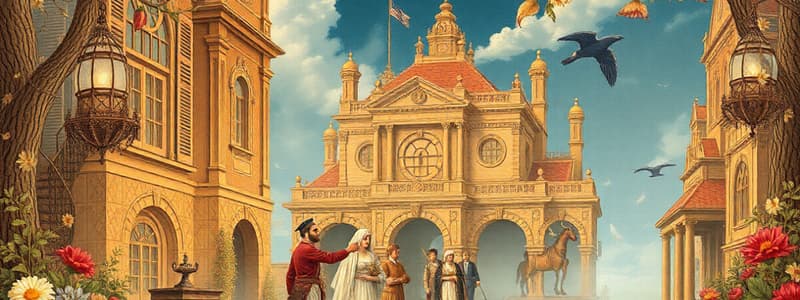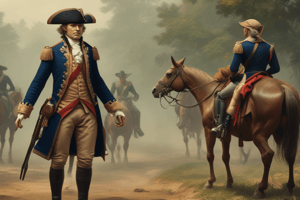Podcast
Questions and Answers
What was the purpose of the Continental Congress meeting again in Philadelphia?
What was the purpose of the Continental Congress meeting again in Philadelphia?
- To discuss trade with Britain
- To negotiate peace with Native Americans
- To write reasons for forming a new country (correct)
- To draft a new constitution
Who was responsible for writing the first draft of the Declaration of Independence?
Who was responsible for writing the first draft of the Declaration of Independence?
- John Adams
- Thomas Jefferson (correct)
- Benjamin Franklin
- George Washington
What significant event occurred in 1783 concerning America's independence?
What significant event occurred in 1783 concerning America's independence?
- The Boston Tea Party took place
- The Revolutionary War officially began
- Great Britain signed an agreement giving the colonies independence (correct)
- The Constitution was ratified
Which countries joined America in 1778, turning the war in America's favor?
Which countries joined America in 1778, turning the war in America's favor?
What did Americans fear regarding a federal government?
What did Americans fear regarding a federal government?
What is the main purpose of the Constitution?
What is the main purpose of the Constitution?
What is one significant concern among states when drafting their constitutions?
What is one significant concern among states when drafting their constitutions?
What is the Bill of Rights primarily intended to do?
What is the Bill of Rights primarily intended to do?
What was a requirement of the Sugar Act for American colonists?
What was a requirement of the Sugar Act for American colonists?
What did Patrick Henry argue regarding taxes imposed on the colonies?
What did Patrick Henry argue regarding taxes imposed on the colonies?
What action did the Continental Congress take regarding British soldiers?
What action did the Continental Congress take regarding British soldiers?
What significant event occurred at the Boston Massacre?
What significant event occurred at the Boston Massacre?
What was the primary argument made by Thomas Paine in 'Common Sense'?
What was the primary argument made by Thomas Paine in 'Common Sense'?
What happened at Lexington, which marked the beginning of the American Revolutionary War?
What happened at Lexington, which marked the beginning of the American Revolutionary War?
Who were the Minutemen?
Who were the Minutemen?
When was the first colony to declare independence, and what was its name?
When was the first colony to declare independence, and what was its name?
Flashcards
Sugar Act
Sugar Act
Colonists were required to pay extra money for sugar and molasses unless it came from Britain.
Stamp Act
Stamp Act
A tax on newspapers, pamphlets, dice, playing cards, and legal documents.
Boston Tea Party
Boston Tea Party
A protest where colonists threw 342 chests of tea into Boston Harbor.
Boston Massacre
Boston Massacre
Signup and view all the flashcards
Rhode Island
Rhode Island
Signup and view all the flashcards
Act of Union
Act of Union
Signup and view all the flashcards
April 18, 1775
April 18, 1775
Signup and view all the flashcards
Thomas Paine's "Common Sense"
Thomas Paine's "Common Sense"
Signup and view all the flashcards
What is a Constitution?
What is a Constitution?
Signup and view all the flashcards
What is a Federal Government?
What is a Federal Government?
Signup and view all the flashcards
What is Congress?
What is Congress?
Signup and view all the flashcards
What is the President's power of veto?
What is the President's power of veto?
Signup and view all the flashcards
What is the Supreme Court?
What is the Supreme Court?
Signup and view all the flashcards
What is the Bill of Rights?
What is the Bill of Rights?
Signup and view all the flashcards
What is freedom of speech?
What is freedom of speech?
Signup and view all the flashcards
What is freedom of religion?
What is freedom of religion?
Signup and view all the flashcards
Study Notes
Discontent in the British Colonies
- The Act of Union joined Scotland and Wales to England.
- In the early 18th century, Englishmen, Scotsmen, Welshmen, and Americans sailed under the British flag.
- Britain aimed to recoup costs from the Seven Years' War by taxing colonists.
- The Sugar Act imposed extra taxes on sugar and molasses unless imported from Britain.
- The Stamp Act taxed newspapers, pamphlets, dice, cards, and legal documents.
- Colonists were required to quarter British troops (provide lodging and food).
- General Assemblies were meetings of colony leaders.
- Patrick Henry opposed the British acts.
- Henry's primary argument was that colonists lacked representation in Parliament.
- King George III repealed some acts but maintained the tea tax.
- The Boston Massacre involved British soldiers firing on a crowd, killing colonists.
- The Boston Tea Party involved colonists dumping tea into Boston Harbor.
- The Continental Congress sought removal of British troops, reopening of the port, and repeal of taxes.
- Patrick Henry famously declared, "Give me liberty or give me death!"
- Minutemen were ready-to-fight colonists.
- On April 18, 1775, British troops marched to Concord to seize weapons.
- Paul Revere and William Dawes warned colonists of the British advance.
- The battles of Lexington and Concord marked the beginning of the war.
- The Second Continental Congress appointed George Washington commander of the Continental Army.
- The Battle of Bunker Hill occurred on June 17, 1775.
- Thomas Paine, in "Common Sense," advocated for complete separation from England.
- Rhode Island was the first colony to declare independence (May 1776).
- The Continental Congress drafted the Declaration of Independence.
- Thomas Jefferson wrote the first draft of the Declaration.
- Britain responded to American independence with an attack using 30,000 men.
- Washington's army crossed the Delaware River on Christmas night, 1776.
- France, the Netherlands, and Spain joined the American cause in 1778.
- The British were cornered at Yorktown, Virginia, in 1781.
- The British surrendered to Americans in 1781, playing "The World Turned Upside Down."
- Britain recognized American independence in 1783.
The American Constitution
- Thirteen American colonies became states.
- A constitution establishes a country's governing rules.
- States disagreed on issues like river use, money types, foreign treaties, navies, and debt repayment.
- Colonists feared a repeating of British rule in a federal government.
- The Constitutional Convention took place in Philadelphia.
- The delegates created a government divided into two houses (Senate and House of Representatives).
- The two houses together constituted Congress.
- Congress creates laws, declares war, and negotiates treaties.
- Congress's laws are subject to presidential veto.
- The President belongs to the executive branch.
- The judicial branch comprises the Supreme Court.
- The Constitution outlines the governance rules.
- Nine states needed to ratify the Constitution.
- The Bill of Rights listed unchallengeable citizen protections.
- Freedom of speech, religion, assembly, and bearing arms are examples of Bill of Rights protections.
Studying That Suits You
Use AI to generate personalized quizzes and flashcards to suit your learning preferences.
Description
Explore the growing discontent in the British colonies that led to revolutionary sentiments. This quiz covers key events, acts, and figures such as the Stamp Act, Boston Massacre, and Patrick Henry's arguments against British taxation. Test your knowledge on how these developments shaped the American Revolution.




